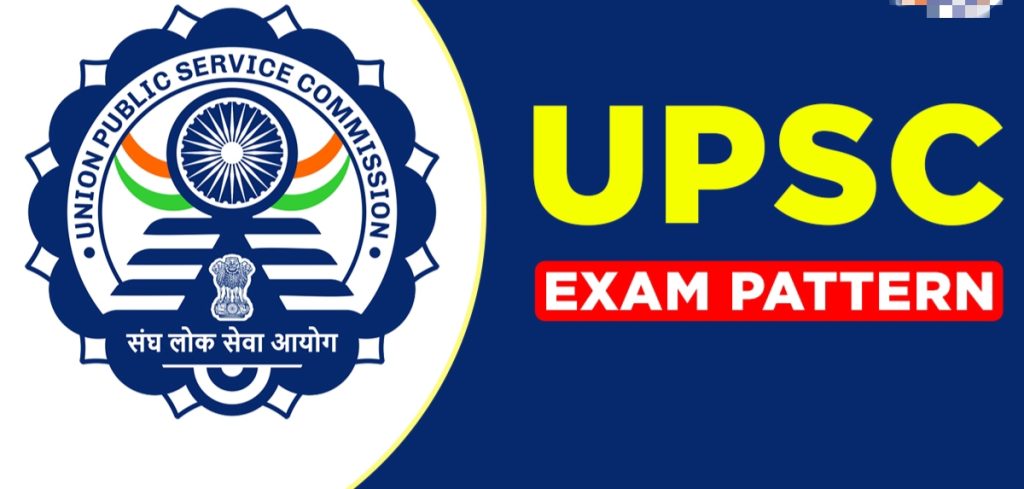
UPSC (Union Public Service Commission) exam pattern consists of three stages: the Preliminary Examination, the Main Examination, and the Personality Test (Interview). Please note that the UPSC may have made changes to the exam pattern since then, so it’s always a good idea to check the official UPSC website for the most up-to-date information.

1. Preliminary Examination:
- The Preliminary Examination is the first stage of the UPSC exam.
It consists of two objective-type papers: General Studies Paper I and General Studies Paper II (CSAT).
General Studies Paper I covers subjects like History, Geography, Polity, Economy, Science and Technology, Environment, and Current Affairs.
General Studies Paper II (CSAT) tests candidates’ aptitude, comprehension, logical reasoning, and analytical ability.
Both papers are conducted on the same day.
Each paper carries 200 marks.
The General Studies Paper II (CSAT) is qualifying in nature, and candidates need to score a minimum of 33% to qualify for the next stage.
The marks obtained in the General Studies Paper I are considered for the selection process.
2. Main Examination:
- The Main Examination is the second stage of the UPSC exam and consists of written tests.
It includes 9 papers, out of which 7 are considered for the final ranking.
The papers include Essay, General Studies I, II, III, and IV, Optional Paper I, and Optional Paper II.
The optional papers can be chosen by the candidates based on their preference and eligibility.
Each paper carries 250 marks, except for the Essay paper, which carries 250 marks.
The total marks for the Main Examination sum up to 1750 marks.
3. Personality Test (Interview):
- Candidates who qualify in the Main Examination are called for the Personality Test, also known as the Interview.
The Personality Test carries 275 marks.
It assesses candidates’ intellectual abilities, social traits, and their overall personality.
The final merit list is prepared based on the candidates’ performance in the Main Examination and the Personality Test.

It’s important to note that the UPSC exam pattern may change over time, and the commission has the authority to modify the pattern as required. It’s advisable to refer to the official UPSC website or notification for the latest and most accurate information regarding the exam pattern and syllabus.
Guide to the UPSC Civil Services Exam: Syllabus,
The Union Public Service Commission (UPSC) Civil Services Examination in India is a highly esteemed exam designed to select candidates for the Indian Administrative Service (IAS), Indian Foreign Service (IFS), Indian Police Service (IPS), and other central services. The examination is known for its rigorous and comprehensive syllabus, which is divided into three stages: Preliminary, Main, and the Personality Test (Interview).
Preliminary Examination
The Preliminary stage is the first hurdle and consists of two objective-type papers (multiple choice questions), serving as a screening test.
1.General Studies (GS) Paper I (200 marks) : This paper tests a candidate’s knowledge in current affairs, history, geography, political science, economics, environmental ecology, and general science. Topics range from current events of national and international importance to economic and social development, biodiversity, climate change, and general science.
2.Civil Services Aptitude Test (CSAT) Paper II (200 marks) : This paper is designed to assess a candidate’s analytical skills, reasoning ability, decision-making skills, problem-solving, basic numeracy, and data interpretation skills. Although this is a qualifying paper, candidates must secure a minimum qualifying mark.
Main Examination
Candidates who clear the Preliminary exam are eligible for the Main exam, which is subjective and consists of nine papers. However, only seven of these are counted for the final ranking.
1.Qualifying Papers :
- Paper-A (Indian Language)**: Candidates can choose one of the languages listed in the Eighth Schedule of the Indian Constitution.
Paper-B (English)**: This paper tests the candidates’ comprehension and language skills.
2.Papers to be Counted for Merit:
- Paper-I (Essay): Candidates need to write essays on multiple topics.
Papers-II to V (General Studies): These papers cover a wide array of subjects including history, geography, polity, social justice, international relations, technology, economic development, biodiversity, environment, security, disaster management, ethics, integrity, and aptitude.
Papers-VI and VII (Optional Subjects) : Candidates have to choose one optional subject from the list provided by UPSC, and there are two papers on this subject.
Interview (Personality Test)
The final stage is the Interview or Personality Test, carrying 275 marks. It assesses the candidate’s mental calibre, social traits, interest in current affairs, and overall personality. This stage is crucial as it evaluates not just the intellectual qualities but also the social traits and interest in current affairs.
Key Points to Remember
- The UPSC exam requires an in-depth understanding of various subjects, analytical skills, and a coherent thought process.
It’s not just about memorizing facts but understanding issues and having a perspective on them.
Regular reading of newspapers, standard textbooks, and practice of writing answers is essential.
The syllabus is vast, so it’s important for aspirants to have a structured study plan and focus on revision.
- – The UPSC syllabus and pattern might change, so staying updated with the latest notifications from the UPSC website is important.
Union Public Service Commission
In summary, the UPSC exam is a challenging but rewarding process, designed to select candidates with a broad knowledge base, strong analytical skills, and a well-rounded personality. Aspirants need to be diligent, focused, and updated with current affairs to succeed in this examination.